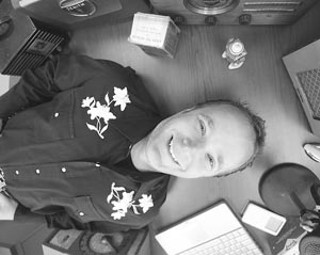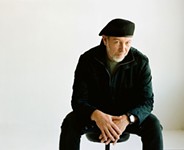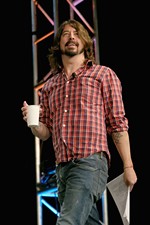Good Night and Good Luck
Invasion of the podcasts
By Dan Oko, Fri., Jan. 13, 2006

It's official: 2005 was the year of the podcast.
In the past 12 months, audio's answer to the blogosphere has become ubiquitous enough that the Oxford American Dictionary even named "podcast" the word of the year. Austin-based singer-songwriter Sara Hickman, a 15-year veteran of the scene, sees this emerging technology as a reason to celebrate.
"It's a wonderful way to broadcast what you do," says Hickman, who podcasts her music at www.zenlala.com/radio.
Despite the fact that Hickman's primarily acoustic sounds might not mark her as an obvious early podcaster, she remains one of very few Austin artists to have taken advantage of this new technology. Of course, not everybody has figured out what podcasting – or blog-casting and audio-blogging to Apple-resistant types – is good for, or even what it is.
Podcasting is defined as a digital, electronic broadcast that can be downloaded to an iPod or other MP3 player, stored and played at will. National Public Radio has made many of its news items available through podcast; locally, KUT podcasts Radio Without Borders, a roundup of live studio performances from local and touring acts, hosted by Teresa Ferguson.
Like the best radio, the best podcasts entertain and surprise. Some are fan sites, run by dedicated amateurs, who are uploading their own music collections. Radio Without Borders (www.kut.org) relies on live musicianship, a strategy that allows KUT to work around the prohibitive cost of licensing label-recorded music. Hickman's podcasts shape up as variety shows; her December installment kicks off with "Santa Claus Is Coming to Town," before she launches into an improvised song about going to the library, which is then followed by some casual advice about songwriting. Then she sings and talks some more.
There are plenty of predominantly spoken-word podcasts, ranging from comedy to hard news; online magazine Slate offers feeds taken directly from the site's published stories. Meanwhile, with Apple's latest generation of iPods boasting video capability, video podcasts are the newest format to jam the information superhighway. Rich Dean, KUT's new maestro of alternative channels, including podcasting, says this booming technology serves the ongoing reinvention of radio.
Shifts in broadcasting include the development of online real-time streaming, and upgrading station signals to high quality in-band, on-channel broadcasts, which although not truly "high-definition" have been trademarked as "HD radio" by its main purveyor, the iBiquity company. One advantage of HD radio, Dean explains, is that it will allow KUT and other broadcasters more outlets, in a manner similar to cable television.
"We're trying to create new content," says Dean, who joined the local frequency in July. "We've got two years of easily accessible digital archives, and [podcasting] is one way to get our content out to new people."
Dean's office is decorated with an array of audio equipment that in many ways reflects America's mutating media landscape. He's got old-fashioned drive-in speakers hanging from his bulletin board and a microphone that looks like it was lifted from Good Night, and Good Luck. One curious device is the Radio Shark antennae plugged into his laptop, which essentially allows Dean to record and replay radio broadcasts ã la TiVo. As for the supposition that podcasting or other alternate technologies might eat into his station's listenership, Dean maintains that KUT's top brass isn't feeling intimidated just yet.
"I don't see cable, the Internet, or podcasting as killing off radio," he says. "We've got 200,000 people listening to us. That dwarfs the number of anybody listening to podcasts."
On the commercial side, meanwhile, several major broadcasters announced earlier this month a new alliance to help push HD radio into the mainstream. One of the hurdles for the broadband radio model is that even the most basic receivers cost about $150. Nonetheless, Clear Channel and Emmis Communications, which both have a strong local presence, are teaming up with six other nationwide companies, contributing more than $200 million in airtime to entice the purchase of equipment that can receive the in-band, on-channel signal, reputed to make FM radio sound like CDs and lift AM to the quality of FM.
"Our side channels will be commercial free for the next two years," explains Scott Gillmore of Emmis, whose local properties include KGSR and 101X.
Podcasts, which can be downloaded through Apple's iTunes and other services, nevertheless offer an array of tantalizing alternatives to hometown radio. Just as faraway listeners can tune into Radio Without Borders, recorded in KUT's barebones Studio 1-A (and featuring local players ranging from Hickman and Spoon to touring acts such as They Might Be Giants), Austinites can now avail themselves of shows like KCRW's Morning Becomes Eclectic out of Santa Monica for live sets by Gang of Four, Yerba Buena, and others. Of course, the Recording Industry Association of America, which represents major record labels, is keeping a close eye on podcasts to make sure nobody broadcasts songs without paying licensing fees and so forth.
As with file-sharing, this means that podcasters must be careful; the threat of legal action, for instance, keeps Hickman from broadcasting her friends. Most radio stations likewise toe the line. Waterloo Records owner John Kunz says that ultimately the RIAA could end up shooting itself in the foot. While he expresses little interest in licensing songs for broadcast through the store's Web site, he celebrates the many new avenues for listeners to learn about music. He has plans to team up with independent music shops nationwide to establish more Web presence.
"The artists get it," says Kunz. "They understand the importance of providing an appetizer for the great meal to come. The content hunters at RIAA suing people just seems so misplaced to me."
Hickman, who naturally "loves Waterloo," subscribes to that popular vision of the future where independent artists forego CDs, adding that between podcasts and electronic downloads, indie labels and artists can compete with the major-label machine. That remains to be seen, of course, but the music industry is seeing a tectonic shift. The Associated Press reported last week that 2005 CD sales dipped about 7%, while album sales peaked at 618 million. At the same time, the number of singles downloaded last year increased a remarkable 148% to nearly 333 million. No one is tracking podcast downloads yet, but it's worth noting that online retailers, not artist sites, remain the primary point of purchase for singles.
At Emmis, Gillmore concedes, "any audio delivery mechanism is competition for time spent with radio," estimating that hours have dropped about an hour per week per listener. Licensing concerns, meanwhile, mean that stations like KGSR are much more likely to podcast news and information shows rather than music itself. "This gives us a reason to focus on compelling local content," notes Gillmore, "so that we can compete with satellite and podcasts."
In Kunz's formulation, with the myriad ways listeners are determining their musical diet, the mystery remains the "ignition point" for any given act. After all, Hickman already had a following by the time her involvement with the major labels collapsed, and by all reports she's a savvy businesswoman, even landing a recent contract to have a song featured on American Idol. The fact remains that even in the Internet age lightning rarely strikes more than once. As podcasting and other new forms of audio media take over, it remains to be seen how our sonic environment will be curated.
For a glimpse of one potential future, there's 27-year-old former Austinite Ben Brown, who recently sold his punky, online dating service Consumating to CNet for an undisclosed sum of money that now affords him living in San Francisco. "I previously had a 100-disc changer. Now I don't use CDs. They're a dead format." Brown doesn't download musical podcasts, because good ones are still few and far between, but he does use iTunes, and not just for music, but for things like NBC's Lost podcasts. "The visual entertainment is a diversion," he says. "The music's a way of life." How does Brown discover new music? Through his friends' blogs.
Having survived the advent of home-taping back in the Eighties and the arrival of now-defunct chain stores like Tower Records in the Nineties, Waterloo's Kunz ultimately views the Internet and podcasting as part of a recipe that will keep his business and the Austin scene going strong.
"The channels that used to be so controlled have been turned upside-down," he says. "In an online, e-mail world, word of mouth somehow gets filtered down, and we're happy to help fill the niche that creates." ![]()








